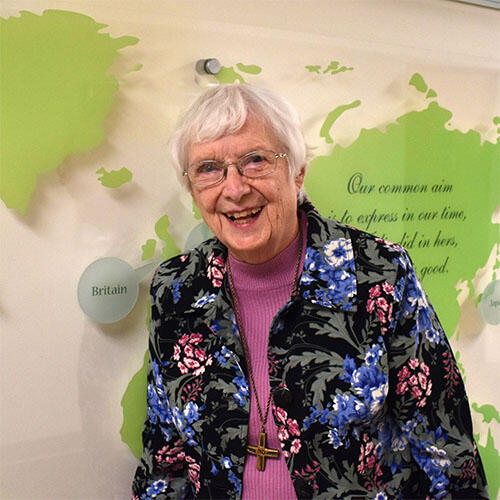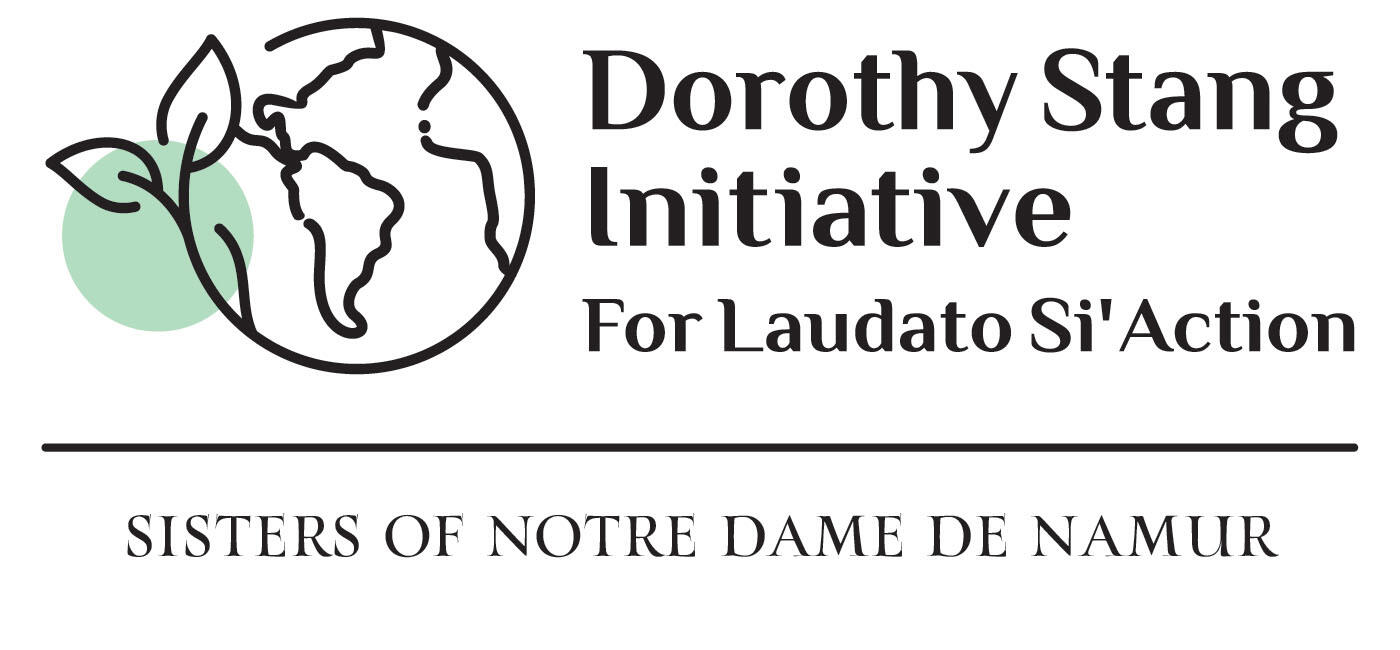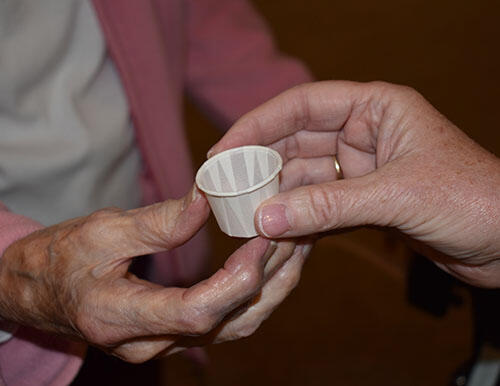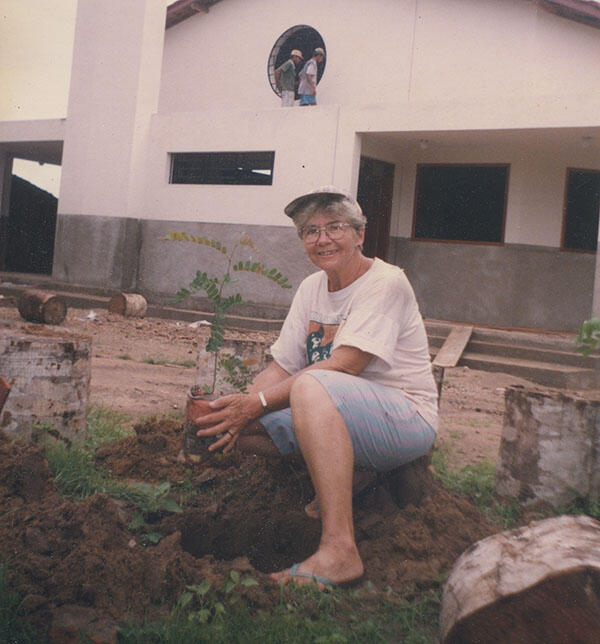
Two priorities were a given – the first with dozens of Notre Dame wells pumping clean water across two African nations, and the second addressed by presidents and prime ministers in media-packed, international conferences focused on climate change.
At the heart of the Dorothy Stang Initiative for Laudato Si' Action are three priorities: clean water, fossil fuels reduction and the reduction of plastics, especially single-use plastics.
 |
| Sister Elizabeth Bowyer, SNDdeN |
But the third priority – that one came unexpectedly. And it came from the 80- and 90-year-old Sisters living in the Mount Notre Dame Health Center.
Spurred into action by Pope Francis’ Laudato Si’ Encyclical of 2015, and in conjunction with the global, seven-year Laudato Si’ Action Platform, Sisters of Notre Dame de Namur have launched the Dorothy Stang Initiative for Laudato Si’ Action. At its heart are three areas of prime concern: clean water, fossil fuels reduction, and after a donnybrook between Health Center Sisters and a pharmaceutical company – the reduction of plastics, especially single-use plastics.
And though the first two are going strong, it is the plastics crusade that has fired up the Mount Notre Dame world of Sisters, Notre Dame Associates and the many employees engaged in the Notre Dame mission.
“Our oceans are filled with it, it’s in the air we’re breathing,” says Sister Elizabeth Bowyer, former twotime Ohio provincial, a former member of the Sisters’ worldwide leadership team in Rome, and now part of the Plastics Task Force of the Sisters’ Initiative.
“Look around at the world you’re in,” she says. “It [plastic] is all around you. It’s with us everywhere. It’s taking over our lives.”
The Clean Water effort is working primarily in Nigeria and the Democratic Republic of Congo pumping and purifying clean water, as well as building photoelectric power systems. It has also constructed a Learning Lab on the Mount Notre Dame campus to allow area students to test technologies for photovoltaic power generation, electrical storage and water purification systems, all to be employed halfway around the world.
In parallel, the Fossil Fuels effort is seeking to reduce the carbon footprint of the Sisters’ Cincinnati campus both through energy conservation and a re-thinking of the now-manicured campus grounds. Instead of wide lawns requiring the use of fossil fuels for cutting, trimming and overall maintenance, the Sisters are committing to natural ground covers and native plants, which together will reduce carbon emissions (through less to no mowing) and provide natural flora and habitat for native species.
The work in Clean Water has been going on for decades. Reducing Fossil Fuels is just beginning, and with small steps. But in the area of plastics, and in particular single-use plastics, the Sisters are finding ample opportunities to make significant leaps forward. And it began with a mutiny of sorts.
Rebellion in the Health Center
Teresa Phillips, director of Justice, Peace and Care of Creation for the Sisters, and also coordinator of the Dorothy Stang Initiative Steering Committee, tells of how Sisters in the Health Center were getting all their prescriptions in single-use plastics — individual doses of medicine in plastic bags, individual pills in plastic caps, etc. “And the Sisters said, ‘Enough!’” Teresa says.
The large pharmacy under contract said there was no choice in the matter, and that’s the way the prescriptions would continue to come.
The Sisters disagreed, and in the back and forth, the pharmacy was fired and another hired, one that would honor the Sisters’ wishes.
“The Sisters said this really matters to them,” Teresa recalls. “It wasn’t something to be dismissed. It’s their home. And so they came up with how to reduce single-use plastics in their daily lives, and to find alternatives.”

That first effort on the assisted living and nursing floors of the Health Center soon expanded to the cafeteria, where Styrofoam, single-use flatware and plastic cups have been phased out. Plastic grocery bags are no longer used on the campus. Yogurt containers, juice bottles and most other plastic packaging is carefully recycled.
“But the more we read,” Teresa says, “the more we researched, we realized that recycling wasn’t the answer. Reduced use was the answer."
Ninety-one percent of all plastics, according to information gathered by the Sisters, has not, and will not, by recycled. This holds true for the more than 15 million metric tons of plastic dumped in the ocean every year, for the 100 billion plastic bags used annually by Americans for an average of 12 minutes (but that last 500 years), and plastics in the coming year the manufacture of which will add as much greenhouse gas as 189 coal fired plants.
What can we can do?
“We need plastics,” says Sister Elizabeth, the former provincial. “We can’t get rid of plastics. But we can contain plastics. Instead, right now, they’re using us. We have the ability to be in charge of our own environment, instead of letting the plastics be in charge."
 |
| The daily medication prescribed to our retired Sisters added up to a lot of wasted plastic until alternatives were found. |
“Look at your lives, look at what you do each day. Then ask, ‘What can I do?’ We all have different opportunities. But right now, we all use single-use plastics.”
In particular, we all use plastic grocery bags.
“Listen, you can’t be a devotional Christian if you don’t pay attention to climate change,” says Sister Mary Ann Barnhorn, SNDdeN, another former provincial who is also involved with the Plastics Task Force.
“This is very practical spirituality,” she says. “It’s not ethereal. It’s not esoteric. Eliminating plastic bags is not costing you money. A lot of things cost you money. This doesn’t. Bring cloth bags [to the grocery store]. It’s something we can all do.”
Something else the Sisters are encouraging, according to Sister Mary Ann, is that everyone should ask family and friends to likewise find plastic bag alternatives, and if possible, to talk with store managers about decreasing the availability of plastic bags at checkout counters.
“We have 29,000 people reading this Cross Currents magazine,” says Sister Mary Ann. “Think about it. Think if 29,000 people did this!”
Why Dorothy Stang?
Sister Elizabeth, as provincial in 2005, took the phone call that Sister Dorothy Stang had been murdered. It was a Saturday. For a while, Sister Elizabeth was alone with the news. The congregational leadership at the time was in Peru for a meeting, unreachable by phone. Sister Meg Walsh, eventually contacted by Sister Elizabeth, carried the news on foot. Similarly, Cincinnati Archbishop Daniel Pilarczyk couldn’t be located. Sister Elizabeth was able to get hold of his secretary. She also notified the U.S. State Department.
 |
| Sister Dorothy Stang, SNDdeN, was ambushed and killed in 2005 for her work to protect the people and environment in Brazil. |
For Sister Elizabeth, Sister Dorothy’s namesake Initiative for Laudato Si’ Action could not be better titled.
"We have the ability to be in charge of our own environment, instead of letting the plastics be in charge." - Sister Elizabeth Bowyer, SNDdeN
“In the first part of the 21st century we weren’t really as involved in the environment as we are now,” she says. “This was new. And it was new for Dot (Sister Dorothy). She lived at a time when change was happening. Dot was growing in her ecological sense. She was growing in her concern for the Earth just as she was concerned so much for people. She was killed standing up for people who had no opportunity to stand up for themselves. Their futures were being wiped out by the conglomerates who were taking the land and taking the forest.”
Today, Sister Elizabeth calls Sister Dorothy “our great ecological champion,” and believes that by placing Sister Dorothy front and center in the Sisters’ environmental ministry, it gives that ministry greater relevance to the wider community.
And involving the wider community is key.
“It’s groups working together that are going to make a difference,” says Sister Mary Ann. “Certainly, Sisters all over the world are taking this seriously. Plastic is so evil, but we have to be careful that we don’t paint a hopeless picture. There is something we can do about this.”
To that end, the Sisters have formed working committees and subcommittees to affect change, including advocacy subcommittees. “We don’t want it to be scattershot,” says Sister Elizabeth. “We want to work through education, careful planning and collaboration.”
This includes the education of students and others, such as through the Learning Lab conversations with retailers, especially grocers; letters to newspaper editors, letter writing campaigns to city council members and state legislators; and joint efforts with Notre Dame schools and other religious communities including the Sisters of Charity and the Sisters of the Precious Blood.
“As we become more aware, and start to do things, the more we grow in our ability to take responsibility for what we believe in. It’s related to hope, and hope makes us all continue to do things that count,” says Sister Elizabeth.
“If we really care,” she says, “we’re going to be on fire to make it better. Dorothy knew the problems were great, but she believed in people and believed we can make a difference!”
Written by Joe Foley. First Published in the 2024 Spring Cross Currents Magazine.
